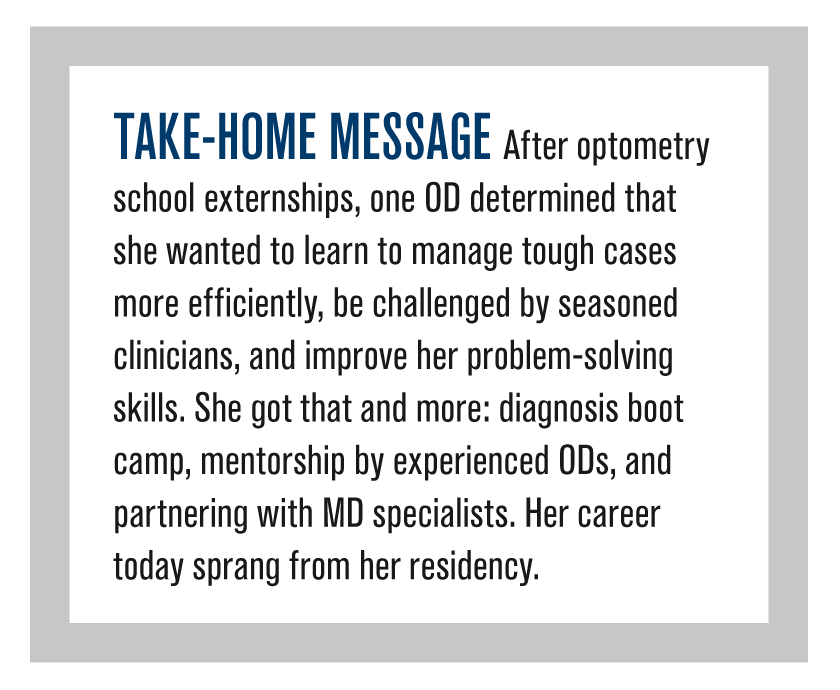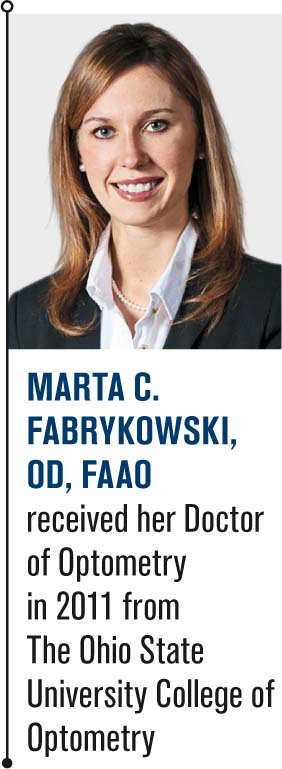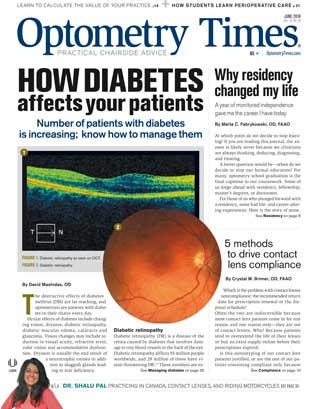How residency changed my life
One OD determined that she wanted to learn to manage tough cases more efficiently, be challenged by seasoned clinicians, and improve her problem-solving skills. She got that and more with her residency.


At which point do we decide to stop learning? If you are reading this journal, the answer is likely never because we clinicians are always thinking, deducing, diagnosing, and treating.
A better question would be-when do we decide to stop our formal education? For many, optometry school graduation is the final capstone to our coursework. Some of us forge ahead with residency, fellowship, master’s degrees, or doctorates.
For those of us who plunged forward with a residency, some had life- and career-altering experiences. Here is the story of mine.
I wanted more
To rewind, optometry school was illuminating-not just from a basic clinical science perspective but also from an experiential point of view.
We were exposed to such a wide breadth of clinical cases-in pediatrics, binocular vision, contact lenses, low vision, refractive, disease, and more. We learned how to hone in on the major points and the finer points and address them with the patient in an empathetic way.
Related: How to crush it with a residency
The cases that personally fascinated me the most had multiple, sometimes confounding elements. For example, as a third-year student, treating a patient complaining of dryness with simultaneous early cataracts and what seemed like early macular mottling in only one eye posed a true conundrum.
How to make multiple diagnoses and complete a full refraction in under one hour? The odds seemed stacked against me.
The Ohio State University College of Optometry’s program included many fantastic specialty clinical rotations that widened our scope of practice and allowed us to experience real-world tertiary patient management. It was especially after the experience of the focused externships that I wanted to learn to manage tough cases more efficiently. I wanted to be challenged by seasoned clinicians and improve my problem-solving skills.
Jumping into residency
I was lucky enough to be one of four residents to match at Omni Eye Services of New Jersey and New York in ocular disease and surgical comanagament, which boasted of exposure to an extraordinary array of specialties. There was a high-volume artist of a cataract and glaucoma surgeon, a brilliant retinal specialist, two oculoplastics gurus, and even a pediatric/strabismus surgeon. This is not to mention the team of extraordinary ODs that essentially ran the show.
I dove right in with helping to see patients-sometimes encountering up to 60 patients a day. Not only was my work busy during business hours, residents also took after-hours on-call. This required learning how to deductively reason through a patient’s symptoms and gauge the severity and urgency depending on the patient’s words and your own questions. If the call was deemed serious enough, it might require seeing the patient after hours or over the weekend to treat or calling the on-call supervising OD with a succinct diagnosis and well-thought-out questions. To say that my diagnostic capabilities sped up a steep slope-mostly out of fear of missing something-is an understatement.
Diagnosis boot camp
The challenges of diagnosing ocular disease is multifactorial-conditions can widely vary in severity, temporal pattern, patient experience, and visual presentation. Residency in ocular disease was a boot camp of sorts.
After my first weekend of being on-call-which included a central retinal artery occlusion with cilioretinal sparing, a leaking trabeculectomy (to my horror, the Goldmann applanation tonometer was not malfunctioning-the intraocular pressure really was around 1 mm Hg), and a florid filamentary keratitis-I was well on my way to learning to think quickly.
Related: Are optometrists really happy?
The monitored independence was a step between being a student and the real world: there was a cushion of specialists whom I could call on, yet preparing for each call required significant thought toward a differential diagnosis. Much like an emergency room, stabilization and accuracy of diagnosis was key before complete treatment or referral to one of our many specializations.
This organization of multiple subspecialties within one practice was illuminating on a myriad of levels. Not only did it provide the comfort of knowing that the patient would receive a high level of continuous care should it be needed, but it allowed a resident to learn how the different subspecialties interrelate. Comprehending the compartmentalization of the MD specializations and sometimes uncanny overlaps was imperative to working as a team-best learned by being thrown into the fire, so to speak.
Working with MDs
In addition, a very valuable and sometimes challenging aspect was working with and under the MDs. Their lengthy schooling, internal medicine training, and resulting expertise was and remains very inspiring.
For ODs, there is an extraordinary opportunity for learning from and partnering with specialists as they all bring different elements to the table. Residency taught me how to navigate the expanse between us and how to capitalize on common goals and comanagement benefits.
Residency also taught me the benefits of optometrists’ strong training in optics-not just from a glasses or contact lens prescription standpoint. It can be used for calculating the power of intraocular lenses, mapping femtosecond laser arcuate incisions to minimize postoperative astigmatism, and gauging higher-level aberrations pre- and post- LASIK correction. We as ODs receive fantastic optics and refraction training (thank you Dr. Donald Mutti, Dr. Thomas Raasch, and Dr. Mark Bullimore of OSU), which can be a true service to ophthalmologists who receive less such focus.
MD-collaboration aside, another invaluable moment was understanding the relationship among ophthalmologic office visits, in-office procedures and outpatient surgeries.
Related: How to manage millennials in the workplace
Residency was my first true experience with independently managing peri-operative care. The responsibility of counseling patients before and after cataract surgery requires accurate and experienced knowledge of all the procedure’s components-from capsulorhexis, to aligning a toric intraocular lens, to the likelihood of developing posterior capsular opacification, and determining who is at risk for developing cystoid macular edema.
This skill, I learned, is also invaluable to ophthalmologists and gives optometrists a great responsibility and respected role. Similarly, learning time-out etiquette and side-side verification-both vital in every ophthalmologic operating room-was something that I experienced solely because of my residency.
OD mentors
Residency was not simply focused on ophthalmology/optometry interactions. The most vital interactions were those with my optometry mentors.
Dr. Katherine Mastrota, who was directing the bustling New York City Omni office, was an invaluable teacher and advisor. Not only was she expert in the various confounding visual field patterns that glaucoma patients who concurrently had suffered a neurological event could exhibit, but she also introduced me to the network of practicing optometrists that I would soon be calling colleagues.
Dr. Mastrota had answers to my most pressing questions:
• Which local organization to join?
• Which practices or schools offer continuing education lectures?
• To which nearby practices specializing in complicated contact lens fittings can we refer?
• Do you know an after-hours neuro-ophthalmologist I can call with a case?
• What happens if patients lose their medical insurance but are still within their 90-day post-op period?
Not only did Dr. Mastrota had the answers, she also provided the encouragement and wise words that helped me to land my current job at a multi-specialty tertiary-care hospital on the Upper East Side of Manhattan. Mentorship in residency is key because it forges lifelong friendships and demonstrates an example to us newer ODs how we too can all become mentors and teachers.
Residency built my career
To say that residency opened doors to my future is an understatement. Residency helped me to develop confidence in managing complicated diagnosis as well as comprehend the moving parts that is massive web of optometry and ophthalmology.
The two disciplines are in some ways inextricably partnered. This can be challenging but also very valuable and can result in a fantastic clinical experience. The ophthalmologists who I work with now are some of my most valued partners, advocates, and friends. Residency challenged me academically with case reports and presentations that resulted in American Academy of Optometry Fellowship and gave me the skills to now lecture regularly to societies and at the local and state levels.
Related: Students can make a difference with advocacy
Residency gave me the courage and knowledge to work side by side with MDs, it taught me to remain ever curious, and it has translated into current multi-specialty grant-funded clinical research projects.
I have no regrets with spending an extra year with a lower income than my colleagues who went directly into practice, nor do I consider myself in less of an optometry advocate by immersing my career alongside MDs.
Every day I am challenged by new manifestations of immunosuppressed patients from our medical retina doctors, complicated intraocular lens calculations (don’t forget to subtract 0.50 D for a sulcus-placed backup lens in the unlikely event that capsule breaks), triaging emergency room patients to the appropriate subspecialty, and feeling comforted that any patient I see will be afforded the proper continuation of care.
Had I not completed a residency, I am not sure that I would be lucky enough to have this challenging career today.

Newsletter
Want more insights like this? Subscribe to Optometry Times and get clinical pearls and practice tips delivered straight to your inbox.